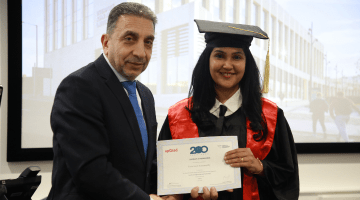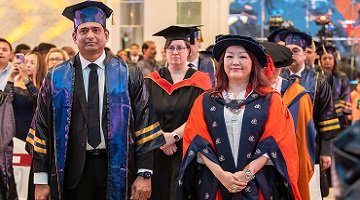Why study Computer Forensics with Foundation Year at LJMU?
- State-of-the-art computing facilities with specialist Computer Forensics Software
- Practical, hands-on experience incorporated into modules wherever possible
- High quality teaching from staff involved in internationally recognised research.
- Exciting careers in Computer Forensics Analysis, Computer Security and Network or System Administration.
- Links with local and national organisations, including Merseyside Police, NCA (National Crime Agency), EY, Experian, IBM, Anexsys, CYFOR and Intaforensics
- A general and broad-based Computing Foundation Year to prepare students for higher study
- Opportunity to undertake a year's paid Industrial Placement
- Start Month: September
- Campus Location: City Campus
About your course
The BSc (Hons) Computer Forensics with Foundation Year at Liverpool John Moores University is the ideal course if you are interested in this subject but lack the necessary qualifications to study it at degree level.
Information technology has transformed the way in which commerce and industry operate, but it has also provided criminals with a new way of committing crime, either against the computer itself or the information it holds. Computer forensics has been developed in response to this relatively new phenomenon, and major organisations are now reliant on computer forensics professionals to protect their sophisticated computing systems.
About the Foundation Year
The Foundation Year is ideal if you have the ability to study for a degree but don't have the qualifications to enter directly onto the Computer Forensics honours degree programme. Once you pass the Foundation Year you will progress directly onto the first year of the honours degree. If you are a full-time UK student, you will qualify for student financial support for the full duration of your course (subject to eligibility criteria).
If you are a full-time UK student, you will qualify for student financial support for the full duration of your course (subject to eligibility criteria).
About the BSc (Hons) Computer Forensics Degree
Using our state-of-the-art computing facilities, including a dedicated lab with FTK, EnCase, Cellebrite and XRY software, and with teaching and staff support that have been commended by the Quality Assurance Agency, this course provides you with the technical, analytical and evaluative skills to be able to carry out computer crime investigations within organisations, law enforcement and national security.
Our graduates enjoy excellent career prospects thanks to our extensive links with local and national organisations, such as Merseyside Police, NCA (National Crime Agency), EY, Experian, IBM, Anexsys, CYFOR and Intaforensics. Such links help ensure that students enjoy excellent work-related learning and paid placement opportunities throughout their degrees.
Work-related learning
A 12-month paid work placement in your fourth year gives you the ideal opportunity to put into practice all you have learnt in the first two years and gain new skills as well. The placement will give you a taste of what its really like to work in the industry and a head start when you come to negotiate your way around the graduate job market.
Course modules
What you will study on this degree
Further guidance on modules
Modules are designated core or optional in accordance with professional body requirements, as applicable, and LJMU’s Academic Framework Regulations. Whilst you are required to study core modules, optional modules provide you with an element of choice. Their availability may vary and will be subject to meeting minimum student numbers.
Where changes to modules are necessary these will be communicated as appropriate.
Core modules
Algorithms and Computing
10 credits
10 credits
This module aims to provide an introduction to technical computing and the application of computers in the implementation of simple algorithms.
Foundation Mathematics for Engineering and Technology 1
20 credits
20 credits
This module aims to provide you with the mathematical knowledge, understanding and skills which are required to use mathematics as an analytical tool in engineering and technology subjects.
Programming
10 credits
10 credits
This module will introduce you to the software development process in order to be able to use a range of computer programming environment and their applications. You will also be able to develop problem solving skills in computing and wider engineering or technology areas.
Personal, Academic and Skills Development
20 credits
20 credits
This year long module supports you in developing the academic and practical skills needed to become an effective and independent learner. It includes regular contact with personal tutors, encouraging a smooth transition into the Higher Education environment.
Information Systems Development
20 credits
20 credits
This module enables you to identify the importance of information and how information can be transformed into developing logical designs in order to develop a working database. This database will manipulate data to produce meaningful information for the end user. You will participate in student-focused learning activities based on a combination of formal lectures and practical, experiential learning in laboratories, with supporting tutorials and seminars designed to reinforce and increase your learning experience.
Creative Computing
20 credits
20 credits
This module provides you with the concepts, methods, techniques and experience to design, develop and manage digital multimedia productions. Lectures will concentrate on the necessary theory of these topics while hands-on practical sessions and workshops will develop the capabilities to design, create, produce and deliver media rich experiences.
Applied Computing
20 credits
20 credits
The emphasis of this module will be on the underlying computing challenges of large-scale applications of the kind regularly featured in the general media. The intention is to demystify these applications and spark your interest in the underlying computing challenges and solutions. Lectures on contemporary applied computing topics will be complemented with lab sessions encouraging you to research information and develop high-level solutions to related problems.
Core modules
Introduction to Programming
20 credits
20 credits
In this module you are delivered programming and problem solving skills with no prior assumptions of programming experience. Given the importance of programming to computer science, this module will encourage you to study more specialised software development topics. You will gain an understanding of how software is developed and become familiar with a range of computer programming paradigms.
Computer Systems
20 credits
20 credits
This module provides you with a basic knowledge in relation to the computing platform (hardware, operating systems, networks) upon which applications are developed and hosted. You will need this as support knowledge for subsequent modules at Level 5 and 6.
Networks and Web Development
20 credits
20 credits
This module provides you with an understanding of modern Internet and web technologies. It will present the technologies underlying computer networking and the applications built on networks. These include interactive Web, development and social media technologies. This module enables you to:
Identify appropriate uses of web client-side technologies Convert user requirements into interactive web pages using modern tools and technologies Identify applications of Network/Internet protocols Describe various features of Computer Networks and the Internet's infrastructure.
Professional Practice
10 credits
10 credits
This module provides you with an opportunity to consider your future role as a computing professional. The tutorials and workshops will be used to develop strategies that you can use, providing opportunities for you to understand the field of Computing in a more effective way. You will develop your understanding of professionalism in computing, of working in the computing industry, and of the ethical frameworks and codes of conduct for the computing industry.
Data Modelling
10 credits
10 credits
The module develops your ability to model data in various differing scenarios. You are initially required to manipulate and present data in spreadsheet based applications. Then, you are required to solve problems using a data modelling methodology (e.g. entity relationship models/normalisation), ultimately leading towards the construction of database based applications.
Introduction to Computer Forensics and Security
20 credits
20 credits
This module provides you with the basic concepts, methods, techniques and experience of computer forensics and security. You will apply your knowledge and develop practical skills in the assessments by undertaking a digital forensic investigation and a security analysis of a case study.
Problem Solving for Computer Forensics
20 credits
20 credits
In this module you will apply your understanding in two assessments. First, you will apply design and problem analysis techniques to a relevant case study scenario involving computer forensics. Second, you will translate such a design into a software solution. This will enhance your software development and problem solving skills, and develop your problem decomposition and analysis skills.
Core modules
Group Project
20 credits
20 credits
The module has two main purposes. First, you will be equipped with adequate research skills and experience of working on subject-related research topics, to lead into your final year project. Second, this module works to enhance your professionalism, including teamworking, which boosts employability and your awareness of what is expected in an employment scenario.
Database Systems
20 credits
20 credits
In this module you will explore the operation of database systems through a scrutiny of modern RDBMS (Relational Data Base Management Systems), the SQL (Structured Query Language) and database connectivity APIs (Application Programming Interfaces). The module continues by exploring some of the managerial considerations of large-scale RDBMS. The module concludes by exploring the operation of emerging NoSQL (Not Only SQL) database systems. Overall, you will design relational databases, develop date driven applications, critically evaluate applications, and design appropriate non-relational databases.
Operating Systems
20 credits
20 credits
Operating systems constitute the backbone of every system management task and knowledge of their structure and use is of high importance for any system/network administrator in modern networked environments. In response, this module introduces you to the fundamental aspects of operating systems and further facilitates the basis for system administration.
Object-Oriented Systems
20 credits
20 credits
In this module you will explore the object oriented paradigm from analysis and design through implementation and testing to maintenance. The UML (Unified Modelling Language) is employed alongside OOP (Object Oriented Programming) to demonstrate key concepts, resulting in mature, fully functioning object oriented systems. You will apply principles and patterns to object oriented systems with test driven development and source control playing a supporting role. The module concludes by exploring the various architectures that object oriented systems may embrace.
Digital Forensics
20 credits
20 credits
This module builds your core computer forensics skills required by you to work in the Computer Forensics industry. These skills will be applied by conducting a simulated Computer Forensics investigation.
Computer Law
20 credits
20 credits
This module aims to provide you with a general understanding of English legal concepts and an understanding of the law in relation to provision of computer services, products and misuse. You will learn to understand the law relating to commercial transactions and develop an awareness of the law relating to intellectual property and the provision of computer products and services.
Optional Modules
Sandwich Year - Computer Forensics
120 credits
120 credits
The aim is to provide you with an extended period of work experience at an approved partner that will complement your programme of study at LJMU. This will give you the opportunity to develop professional skills relevant to your programme of study as well as the attitude and behaviours necessary for employment in a diverse and changing environment.
Study Year Abroad - Computer Forensics
120 credits
120 credits
This module provides you with an additional year of study at an approved overseas partner. It will complement your programme of study at LJMU. You will demonstrate the acquisition of programme-related learning having followed your approved course of study abroad.
Core modules
Project
40 credits
40 credits
This module presents you with the opportunity to complete a substantial project in a chosen area relevant to your programme. The scope of what is an appropriate artefact varies between programmes and you will discuss this with your programme teams. This module will enable you to use rigorous development or scientific methods to produce an artefact, resulting in an oral and written report.
Computer Security
20 credits
20 credits
This module aims to develop your understanding of Computer Security including security threats and vulnerabilities to information, computing and communications systems. Through critically assessing a variety of generic security technologies for protection of computer networks, you will develop practical skills in the use of security countermeasure technologies and associated tools.
Network Forensics
20 credits
20 credits
Computer networking is now a ubiquitous feature of modern life with the applications and services that we rely on daily being supported by the Internet. Conversely, as the services become more fundamental, the number and range of attacks levelled against them have increased both in severity and frequency. As such, modern digital forensics investigations are increasingly including some element of network investigation and network operators are increasingly employing forensic techniques to effectively manage their infrastructures. This module aims to develop your critical appreciation of both the theoretical issues of computer networks and their impact on digital forensic investigations, alongside the emergence of new networking technologies and how they will impact on network forensics.
Forensic Investigatory Practice
20 credits
20 credits
This module provides you with an understanding of Computer Forensics investigations and the presentation of evidence in a court of law. You will develop your understanding of the role of the expert witness in trials involving Computer Forensics and learn to identify a range of appropriate methodologies and tools used during an investigation. The assessment is structured around the phases of a computer forensic investigation, starting with the 'crime', its analysis and finally the presentation of evidence.
Cloud and Mobile Forensics
20 credits
20 credits
With the rise of smartphones and the explosion of apps running on them that are supported by extensive back-end services, two of the most significant new areas of computing are mobile devices and cloud computing. With this massive rise in usage, new areas of digital forensics are now emerging to cater for the investigation of those user devices and the backend infrastructure respectively. This module enables you to examine how forensic investigations can be conducted in this area and identify the key similarities and differences involved.
Your Learning Experience
Excellent facilities and learning resources
We adopt an active blended learning approach, meaning you will experience a combination of face-to-face and online learning during your time at LJMU. This enables you to experience a rich and diverse learning experience and engage fully with your studies. Our approach ensures that you can easily access support from your personal tutor, either by meeting them on-campus or via a video call to suit your needs.
You will begin the course with a 3-day induction and then spend approximately 15 hours per week in the classroom.
Independent study is a fundamental element of the course and accounts for about 70% or 35 hours of your weekly study time.
Teaching is mostly via lectures with more informal lab sessions, online activities and small-group tutorials to reinforce ideas discussed in the lectures and to give you a chance to develop ideas with staff and other students.
Work-related Learning
A 12-month paid work placement in your fourth year gives you the ideal opportunity to put into practice all you have learnt in the first two years and gain new skills as well.
The placement will give you a taste of what its really like to work in the industry and a head start when you come to negotiate your way around the graduate job market.
Dedicated personal tutor, plus study skills support
This is a supportive and friendly school in which staff have been officially commended for their high levels of student support and commitment to learning and course development. Should you choose to undertake a years work placement, this support will continue as a supervisor will stay in close contact during your placement.
Your Lecturers
We are proud of our academic staff's high quality teaching standards and approachability. Informal staff-student relationships are excellent.
If you decide to study with the School of Computer Science and Mathematics you will be joining a relaxed and friendly community in which staff are committed not only to their students welfare but also to ensuring that courses are continually developed to meet the needs of employers.
Assessment varies depending on the modules you choose, but will usually include a combination of exams and coursework.
You will be assessed by a combination of coursework and exams plus an independent final year project which contributes substantially to your final mark. Your tutors will give prompt and constructive feedback via Canvas (our virtual learning environment), face-to-face or in writing. This will help you to identify your strengths as well as the areas where you may need to put in more work.
Career prospects
Most of our graduates go on to careers as computer forensics analysts, computer security consultants, network or system administrators, or data analysts.
You could find yourself working in one of a wide variety of fields including data mining, forensics applications development, the police, intelligence, security or computer forensics initiatives, network security management or education.
Professional accreditation / links
The Department of Computer Science has strong links with local and national organisations mean that all of our computing courses are designed and developed to suit the needs of employers today, as well as creating excellent work placements for students.
Currently we have close ties with Merseyside Police, NCA (National Crime Agency), EY, Experian, IBM, Anexsys, CYFOR and Intaforensics to name just a few.
Where you will study
What you can expect from your School
This programme is delivered in the Byrom Street complex of LJMU's City Campus. Here you'll find high quality lecture theatres, meeting and seminar rooms plus social spaces and a large café. The Avril Robarts Library is just minutes away on Tithebarn Street.
The Computer Forensics degree has given me the knowledge and experience to succeed in this exciting field of work, with the opportunity to gain certification in the use of proprietary forensic tools. My placement year at LJMU was spent in Merseyside Police's Digital Forensics Unit, and I have now gained full-time employment in digital forensics..
Course tutors
-
 Reader
Reader -
 Lecturer/Senior Lecturer
Lecturer/Senior Lecturer -
 Programme Leader
Programme Leader -
 Lecturer
Lecturer
Career paths
Most of our graduates go on to careers as computer forensics analysts, computer security consultants, network or system administrators, or data analysts.
You could find yourself working in one of a wide variety of fields including data mining, forensics applications development, the police, intelligence, security or computer forensics initiatives, network security management or education.
"The experience provided by the sandwich year has given me the edge over other students applying for the same roles. The degree has given me the tools to succeed in this rapidly growing and developing industry."
Stephen Wilson, current student
Student Futures - Careers, Employability and Enterprise Service
A wide range of opportunities and support is available to you, within and beyond your course, to ensure our students experience a transformation in their career trajectory. Every undergraduate curriculum includes Future Focus during Level 4, an e-learning resource and workshop designed to help you to develop your talents, passion and purpose.
Every student has access to Careers Zone 24/7, LJMU's suite of online Apps, resources and jobs board via the LJMU Student Futures website.
Professional accreditation/links
The School of Computing and Mathematics has strong links with over 450 local and national organisations mean that all of our computing courses are designed and developed to suit the needs of employers today, as well as creating excellent work placements for students.
Currently we have close ties with Corus, Unilever, Sony Computer Entertainment Europe, IBM, Eutechnyx, Jagex, Spiral House, Heinz, Liverpool Direct, Pilkington, MBNA Bank, HM Treasury, Lloyds TSB, Merseyside Police, Thames Water Authority, AstraZeneca, Littlewoods, Vauxhall Motors and GlaxoSmithKline to name just a few.
Fees and funding
Tuition Fees:
- Home fee:
- £9,250
- Placement year:
- £1,850
Fees
The fees quoted above cover registration, tuition, supervision, assessment and examinations as well as:
- library membership with access to printed, multimedia and digital resources
- access to programme-appropriate software
- library and student IT support
- free on-campus wifi via eduroam
Additional costs
Although not all of the following are compulsory/relevant, you should keep in mind the costs of:
- accommodation and living expenditure
- books (should you wish to have your own copies)
- printing, photocopying and stationery
- PC/laptop (should you prefer to purchase your own for independent study and online learning activities)
- mobile phone/tablet (to access online services)
- field trips (travel and activity costs)
- placements (travel expenses and living costs)
- student visas (international students only)
- study abroad opportunities (travel costs, accommodation, visas and immunisations)
- academic conferences (travel costs)
- professional-body membership
- graduation (gown hire etc)
Funding
There are many ways to fund study for home and international students. From loans to International Scholarships and subject-specific funding, you'll find all of the information you need on our specialist funding pages.
- International fee:
- £18,250
- Placement year international:
- £3,830
Courses_UG_Fees_Funding_Subheading_International
Liverpool John Moores University is committed to supporting international students by providing a range of scholarships and flexible payment plans to help students manage their tuition fees.
Scholarships
LJMU provides a variety of scholarships to support international students. Scholarships are available to self-funded students who have accepted their offer and met all the conditions outlined in their offer letter. Students must also demonstrate that they can cover living costs, travel, and other expenses associated to studying at the university. Postgraduate scholarships include tuition fee reductions and are often offered in partnership with external funding organisations.
All self-funded international students are eligible for an automatic scholarship worth up to £4,000. For more details and to view our full list of scholarships, visit the international scholarship webpages.
Deposit
All students must pay a £5,000 deposit before they can receive their CAS letter.
For more information view our deposit page.
Tuition Fee Payment Plan
After paying their £5,000 deposit, students have the option to pay their fees in full or in three equal instalments minus any internal scholarships and discounts. There are two payment options available for international students. You can either pay your tuition fees in full before enrolment or opt for a payment plan. With the payment plan, you can pay your fees in three instalments after making your £5,000 deposit. The first instalment is due before enrolment.
All payments should be made through Flywire. Full details can be found in the How to Pay Guide.
Early Bird Tuition Fee discount
We are excited to introduce a £500 Early Payment Discount to all self-funded international students. Eligible self-funded students who pay their fees by the required deadlines will get a discount which will be automatically deducted from the 1st year of tuition fees.
To see the required deadlines please visit the webpage
Entry requirements
Please choose your qualifications below to view requirements
Grades/points required from qualifications: CCD-CCC (88-96)
Work out how many UCAS points your qualifications are worth using the UCAS Tariff Calculator.
Qualification requirements
GCSEs and equivalents
Grade 4 or grade C or above in English Language and Mathematics/ Numeracy.
GCSE Equivalences accepted:
• Key Skills Level 2 in English/Maths
• NVQ Level 2 Functional skills in Maths and English Writing and or Reading
• Skills for Life Level 2 in Numeracy/English
• Higher Diploma in Maths/English
• Northern Ireland Essential Skills Level 2 in Communication or Application of Number
• Wales Essential Skills Level 2 in Communication or Application of Number
A levels
CCD-CCC
BTECs
Extended Diploma: MMM (96)
Access awards
Acceptable on its own and combined with other qualifications
Pass overall with a minimum of 88 points.
International Baccalaureate
Acceptable on its own and combined with other qualifications
OCR Cambridge Technical
Extended Diploma: MMM (96)
Irish awards
Acceptable on its own and combined with other qualifications
T levels
Acceptable on its own and combined with other qualifications.
You need to obtain the required UCAS points from a related subject area.
International requirements
IELTS
6.0 overall with no component below 5.5, taken within two years of the course start date.
https://www.ljmu.ac.uk/study/courses/international-entry-requirements
Please Note: All international qualifications are subject to a qualification equivalency check.
How to apply
Securing your place at LJMU
UCAS is the official application route for our full-time undergraduate courses. Further information on the UCAS application process can be found here https://www.ljmu.ac.uk/study/undergraduate-students/how-to-apply.
Your student experience
There's so much more to university than just studying for a degree
Talk to our students
Connect with a current LJMU student through Unibuddy for insights and advice on university life, courses, and more.
See what our students are saying
At LJMU we want you to know you're making the right choice by studying with us. You can see what our students are saying about their experience with us through their reviews on the following websites:
Related Links
News and views
Browse through the latest stories and updates from the University and beyond










The university reserves the right to withdraw or make alterations to a course and facilities if necessary; this may be because such changes are deemed to be beneficial to students, are minor in nature and unlikely to impact negatively upon students or become necessary due to circumstances beyond the control of the university. Where this does happen, the university operates a policy of consultation, advice and support to all enrolled students affected by the proposed change to their course or module.
Further information on the terms and conditions of any offer made, our admissions policy and the complaints and appeals process.











